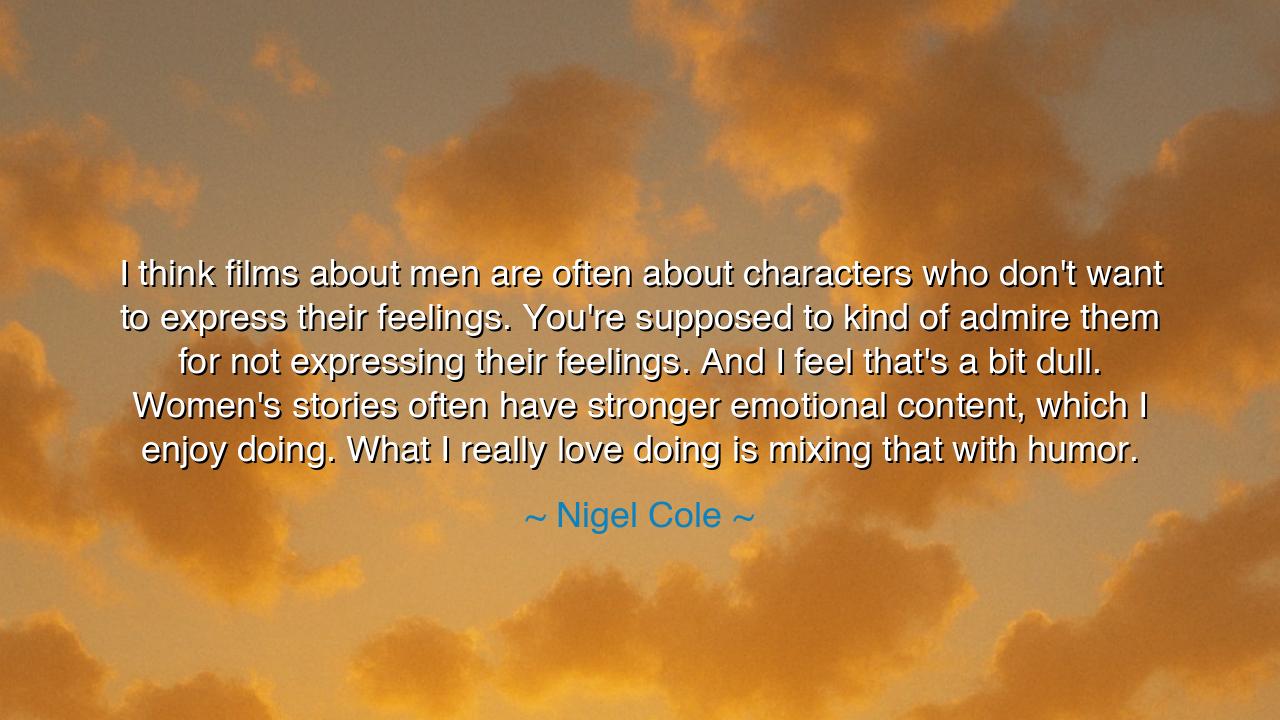
I think films about men are often about characters who don't want
I think films about men are often about characters who don't want to express their feelings. You're supposed to kind of admire them for not expressing their feelings. And I feel that's a bit dull. Women's stories often have stronger emotional content, which I enjoy doing. What I really love doing is mixing that with humor.






The words of Nigel Cole — “I think films about men are often about characters who don’t want to express their feelings. You’re supposed to kind of admire them for not expressing their feelings. And I feel that’s a bit dull. Women’s stories often have stronger emotional content, which I enjoy doing. What I really love doing is mixing that with humor.” — speak not merely as a reflection on art, but as a profound meditation on human nature itself. Beneath these words lies the ancient truth that strength without vulnerability is hollow, and that to feel deeply is not a weakness but a mark of wisdom. Cole, through his craft, calls us to remember that emotion and humor are not opposites — they are twin flames that illuminate the fullness of life.
In his reflection, Cole critiques a long tradition of storytelling — the stoic hero, the silent man, the figure who suffers nobly but speaks little. For centuries, this archetype has dominated art and myth alike. From the warrior kings of ancient epics to the hard-edged men of modern cinema, the image of masculine virtue has often been bound to restraint. These men bear pain but never name it; they love but seldom confess it. Yet Cole, with the clarity of a true storyteller, finds such emotional silence lacking — “a bit dull,” as he says. For stories that deny the heart deny life itself. The ancients knew this too: Achilles, the mightiest of warriors, was great not because of his sword alone, but because he dared to weep, to rage, to love. His tears made him human; his humanity made him heroic.
Women’s stories, Cole reminds us, have long carried the emotional truths that men’s tales often suppress. In their arcs, we find the sacred pulse of vulnerability — the courage to feel, to break, to rebuild. From the tragedies of Antigone and Medea, to the quiet strength of the women in modern cinema, these tales do not hide the soul’s turbulence. They reveal it. And in doing so, they offer a mirror to us all, showing that emotion is not chaos to be feared, but the very fabric of existence. To feel deeply is to live deeply. It is through emotion that we find empathy, and through empathy that we find meaning.
But Cole does not stop at emotion — he speaks also of humor, that divine element which balances sorrow with light. Humor is the wisdom that sees life’s contradictions and still chooses joy. It is the sigh that becomes a smile, the tear that turns to laughter. The ancients revered this alchemy: the philosopher Heraclitus taught that the universe is harmony of opposites — the tension between dark and light, grief and mirth. So too does Cole find art’s perfection in this blend — the intertwining of emotion and humor, where pain is not denied but transformed. True storytelling, he suggests, does not separate laughter from tears; it lets them dance together, revealing the beauty of both.
There is an ancient tale from the East of a monk who laughed at funerals and wept at weddings. When asked why, he said, “Because all things contain their opposite.” This, too, is the wisdom of Nigel Cole’s approach to film: that the heart of life lies not in purity, but in paradox. His love for stories with emotional depth and humor springs from this truth — that the human spirit is not meant to live in a single tone. We laugh because we grieve; we grieve because we have loved. The power of art lies in embracing both, letting laughter cleanse sorrow, and sorrow deepen laughter.
The origin of his belief likely flows from his own storytelling journey — from directing works like Calendar Girls and Made in Dagenham, where the struggles and triumphs of ordinary women are infused with wit and humanity. In these tales, humor is not decoration; it is defiance. The laughter of his characters does not deny pain — it conquers it. Their emotions, unhidden and unapologetic, become acts of rebellion in a world that often rewards detachment. In their joy, as in their tears, they reclaim their dignity and their power.
The lesson in Cole’s words is eternal: do not mistake silence for strength. To feel is not to falter; to laugh amid tears is not to flee sorrow, but to master it. In your own life, dare to express what lies within you. Let your heart speak — in grief, in love, in confusion, in delight. And when the weight of the world presses down, meet it not only with solemnity but with humor, for laughter is the spirit’s rebellion against despair. It is the light that refuses to die, even in darkness.
So, dear listener, remember this: life is not meant to be a stoic march, but a dance — of feeling and laughter, of heart and light. Follow the wisdom of Nigel Cole, and seek stories — and lives — that are rich with emotion and alive with humor. For those who can cry honestly and laugh freely are not weak — they are the ones who truly understand the sacred art of being human.






AAdministratorAdministrator
Welcome, honored guests. Please leave a comment, we will respond soon